全国通用 小学英语小升初专题复习--一般现在时 课件 (共66张PPT)
文档属性
| 名称 | 全国通用 小学英语小升初专题复习--一般现在时 课件 (共66张PPT) | 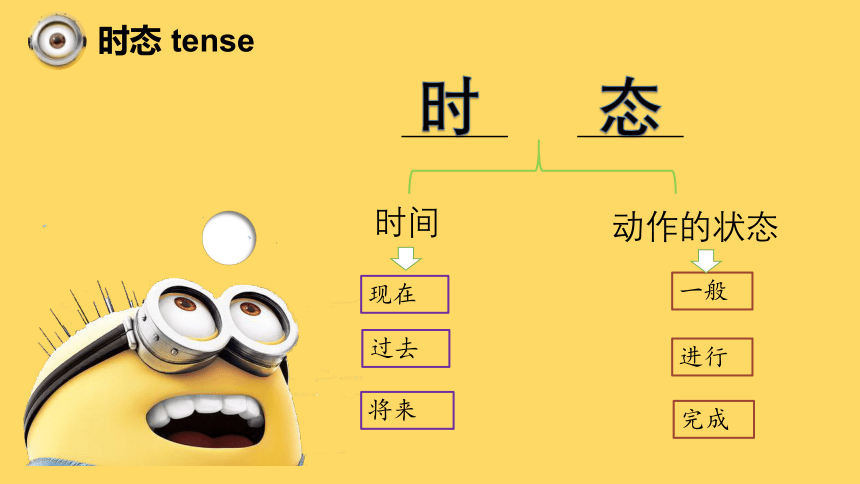 | |
| 格式 | pptx | ||
| 文件大小 | 181.3MB | ||
| 资源类型 | 教案 | ||
| 版本资源 | 通用版 | ||
| 科目 | 英语 | ||
| 更新时间 | 2022-05-13 10:59:58 | ||
图片预览

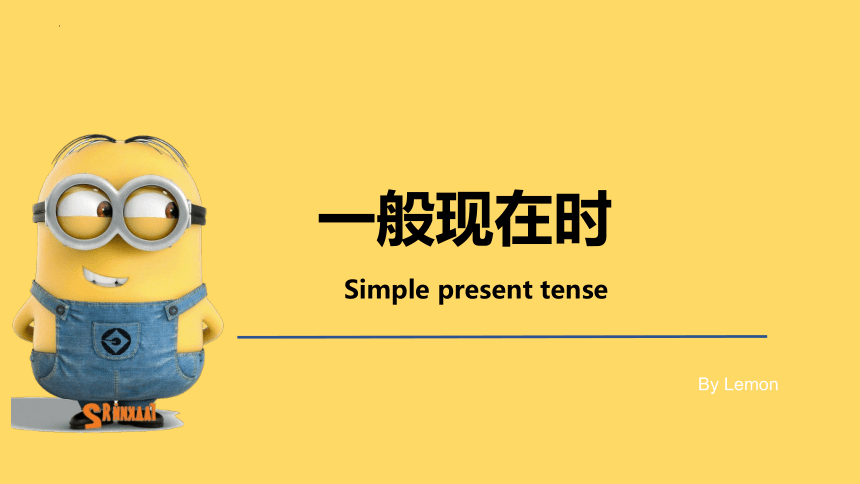
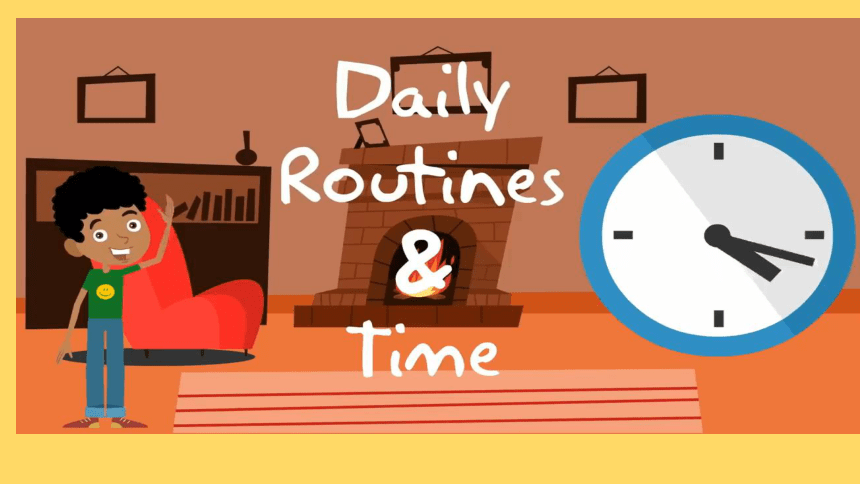
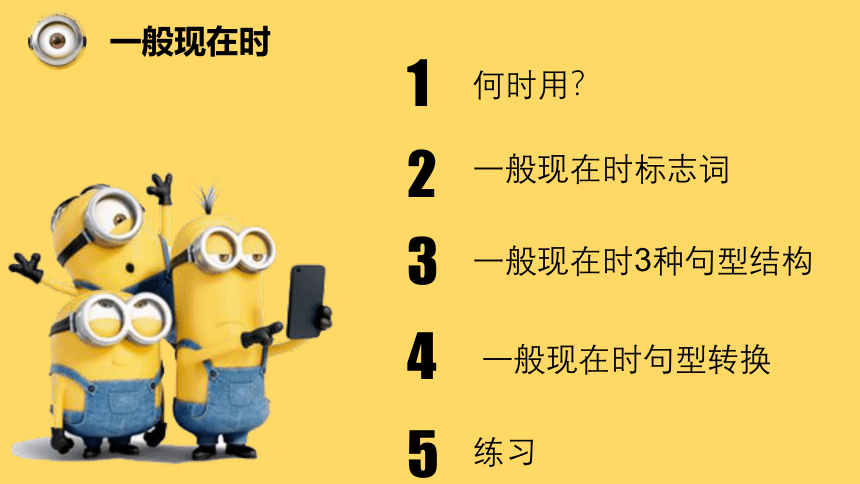

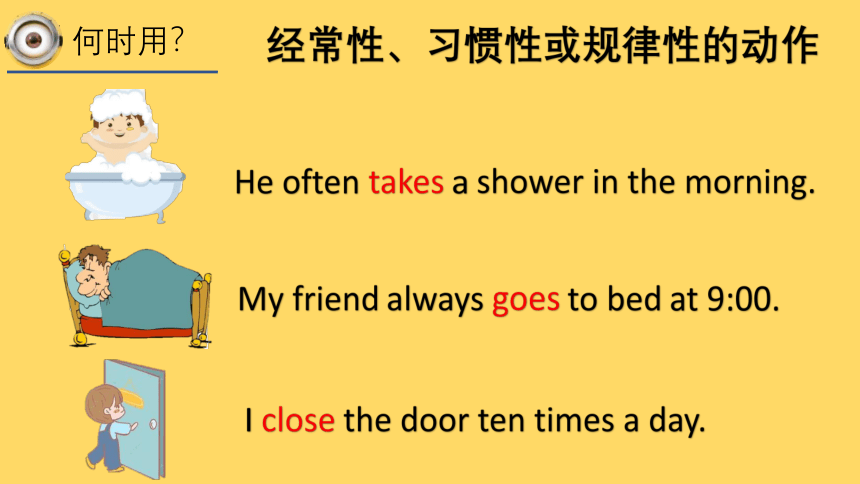
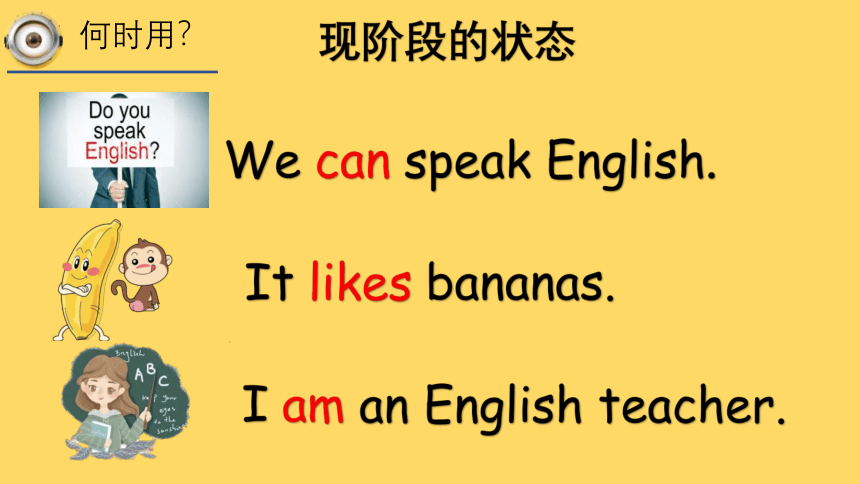
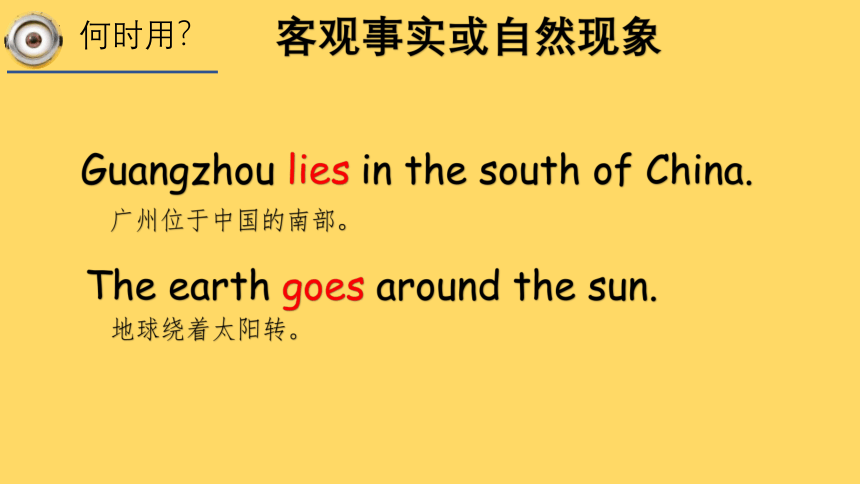

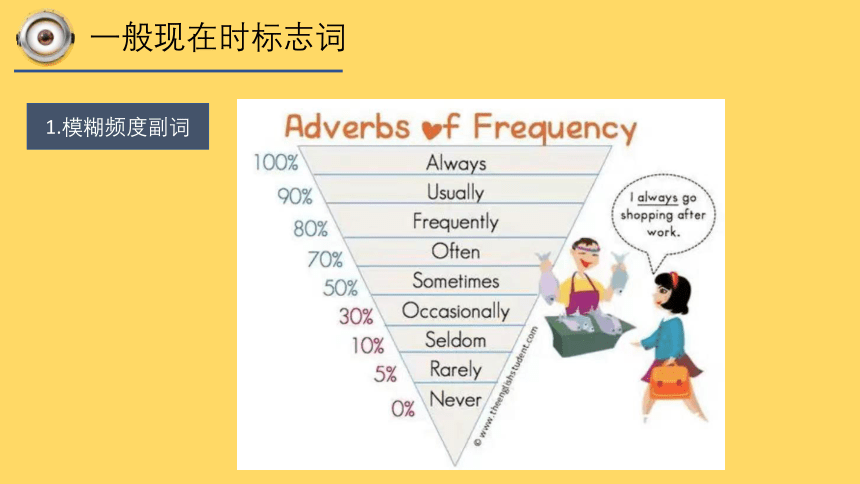
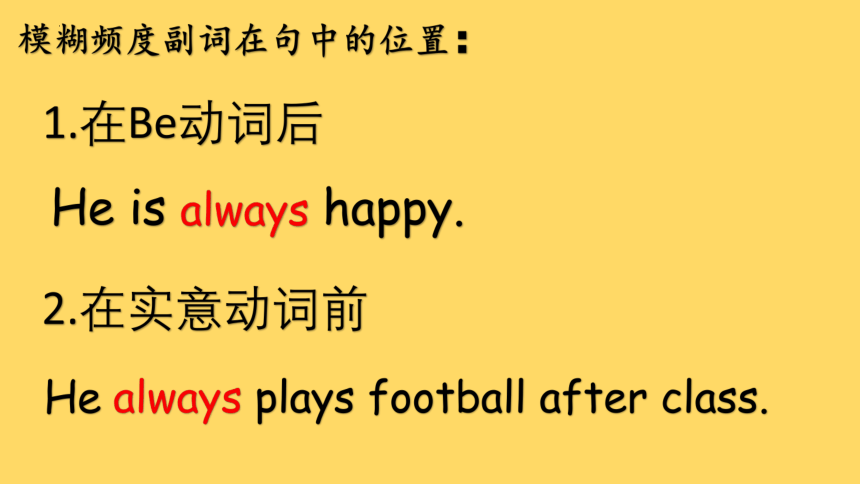
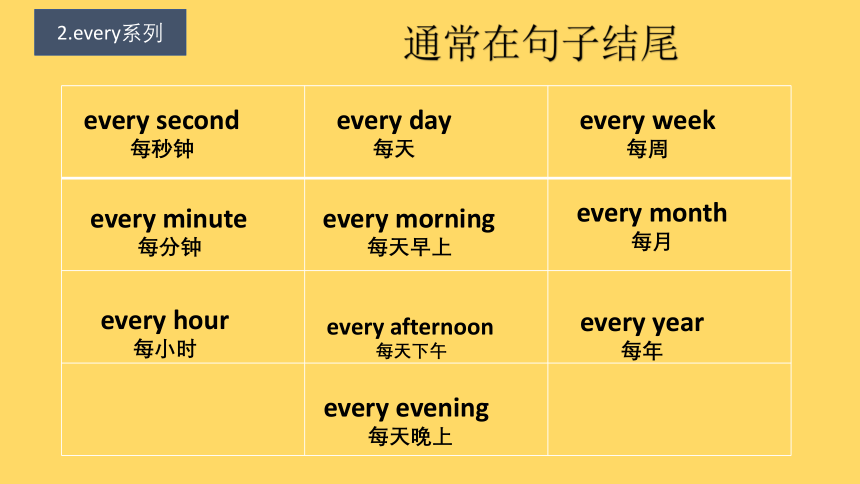
文档简介
时态 tense
现在
过去
将来
一般
进行
完成
时 态
时间
动作的状态
一般现在时
Simple present tense
By Lemon
1
2
3
何时用?
一般现在时标志词
一般现在时3种句型结构
一般现在时
4
练习
5
一般现在时句型转换
何时用?
1
经常性、习惯性或规律性的动作
何时用?
He often takes a shower in the morning.
My friend always goes to bed at 9:00.
I close the door ten times a day.
何时用?
现阶段的状态
We can speak English.
It likes bananas.
I am an English teacher.
何时用?
客观事实或自然现象
Guangzhou lies in the south of China.
The earth goes around the sun.
广州位于中国的南部。
地球绕着太阳转。
一般现在时标志词
2
一般现在时标志词
1.模糊频度副词
模糊频度副词在句中的位置:
1.在Be动词后
2.在实意动词前
He is always happy.
He always plays football after class.
2.every系列
every second
每秒钟
every hour
每小时
every day
每天
every week
每周
every minute
每分钟
every morning
每天早上
every afternoon
每天下午
every evening
每天晚上
every month
每月
every year
每年
{5C22544A-7EE6-4342-B048-85BDC9FD1C3A}
通常在句子结尾
{5C22544A-7EE6-4342-B048-85BDC9FD1C3A}
3.次数
once
一次
twice
两次
three times
三次
four times
四次
five times
五次
six times
六次
seven times
七次
eight times
八次
twice a day
一天两次
once a week
一周一次
three times an hour
一小时三次
通常在句子结尾
一般现在时3种句型结构
3
一般现在时句型结构
含有be动词
含有实义动词
含有情态动词can
1
2
3
一般现在时句型1---含be动词
一般现在时句型1---含be动词
am/is /are
我用am
你用are
is跟着他,她,它
单数名词用is
复数名词用are
He is a policeman
There’s a dog on the floor.
主语+be动词+其他。
肯定句:
我用am
你用are
is跟着他,她,它
单数名词用is
复数名词用are
He is a policeman.
There’s a dog on the floor.
He isn’t a policeman.
There isn’t a dog on the floor.
一般现在时句型1---含be动词
主语+be动词+not+其他。
否定句:
我用am
你用are
is跟着他,她,它
单数名词用is
复数名词用are
He is a policeman.
There’s a dog on the floor.
Is he a policeman?
Is there a dog on the floor?
Be动词+主语+其他?
一般现在时句型1---含be动词
一般疑问句:
用be动词适当形式填空。
1.My name ____ Xiaohui. I _____ Chinese.
2.Sophie _____not Italian. She______ French.
3.Mr. Blake _____my teacher. He ____not French.
4.Those children______ tired.
5.Their mother ______ thirsty.
6.That ice cream man ______very busy.
7.What’s the matter , Tim? I _____hungry.
8.There ___some milk in the bottle.
9.There ____some pictures on the wall.
10.Those women _____tall.
is
am
is
is
is
is
are
is
is
am
are
are
is
1.Miss Gao是我的英语老师。
2.Tim 和 Jim 是好朋友。
3.他不在学校。
4.花瓶里面有一些花。
5.这些是我的裙子。
6.街道上有一些男警察。
7.瓶子里有一些牛奶。
翻译下面句子。
Miss Gao is my English teacher.
Tim and Jim are good friends.
He isn’t at school.
There is some flowers in the vase.
These are my dresses.
There are some policemen on the street.
There is some milk in the bottle.
8.我爸爸总是很忙。
My father is always busy.
一般现在时句型2---含实意动词
一般现在时句型2---含实意动词
wash
brush
cook
eat
drink
clean
smell
go
begin
knock
open
enter
close
teach
end
throw
catch
leave
drive
hug
kiss
do
water
sleep
dream
read
ride
jump
watch
swim
do homework
做家庭作业
do housework
做家务
do morning exercise
做早操
do sports
做运动
do kung fu
练武术
do做
play玩
play with me
和我一起玩
play sports
做运动
play football
play basketball
打篮球
play soccer
踢足球
play tennis
打网球
play table tennis
play ping-pong
打乒乓球
play volleyball
打排球
play badminton
打羽毛球
play
play hide and seek 捉迷藏
play computer games 玩电脑游戏
play the piano
弹钢琴
play the violin
拉小提琴
play the guitar
弹吉他
play the pipa
弹琵琶
play the drums
打鼓
去划船
去钓鱼
去购物
去游泳
去滑冰
去滑雪
go
去学校
去电影院
看电影
去散步
去工作
上床睡觉
go
回家
实意动词特点:
随主语变化而变化
主语是非三单,实意动词用原形
主语是三单,实意动词用三单形式
一般现在时句型2---含实意动词
非三单主语+动词原形+其他。
肯定句:
三单主语+动词三单+其他。
I
you
we
they
the boys
children
she
he
it
the boy
the teacher…
1
2
三单主语
非三单主语
my mother
Mrs. Blake
teachers
women
woman
child
my parents
辨别三单主语和非三单主语
非三单主语+动词原形+其他。
一般现在时句型2---含实意动词
1. 我每天做家庭作业。
2. 我们一周做3次做家务。
3.我的父母每天晚上去散步。
I do homework every day.
We do housework three times a week.
My parents go for a walk every day.
4. 我星期四做一些阅读。
5. 我星期六去滑冰。
I do some reading on Thursday.
I go skating on Saturday.
6. 我通常10点上床睡觉。
I usually go to bed at 10 o’clock.
7. 我很少去购物。
I seldom/rarely go shopping.
We have a PE class at 4:30.
I go home at 6:00.
8. 我们4点半上体育课。
9. 我6点回家。
10. 他们星期二上数学课。
They have math class on Tuesday.
11.我通常在春天吃冰淇淋。
I usually eat ice cream in spring.
People often plant trees in March.
12.人们经常在三月份种树。
13. 我经常下课后看书。
I often read books after class.
I get up at 7 o’clock.
7:00
I don’t get up at 7 o’clock.
一般现在时句型2---含实意动词原形
非三单主语+动词原形+其他。
肯定句:
否定句:
非三单主语+don’t+动词原形+其他。
I get up at 7 o’clock.
Do you get up at 7 o’clock?
No , I don’t.
Yes, I do.
一般现在时句型2---含实意动词原形
Do+非三单主语+动词原形+其他?
一般疑问句:
肯定回答:
否定回答:
注意:人称的变化
{5940675A-B579-460E-94D1-54222C63F5DA}特殊疑问词(7W1H)
{5940675A-B579-460E-94D1-54222C63F5DA}Who…?
谁。针对人进行提问
{5940675A-B579-460E-94D1-54222C63F5DA}What…?
什么。针对事物进行提问。
{5940675A-B579-460E-94D1-54222C63F5DA}Where…?
哪里。问地点
{5940675A-B579-460E-94D1-54222C63F5DA}Why….?
为什么。 问原因
{5940675A-B579-460E-94D1-54222C63F5DA}When…?
什么时候。问某一件事情的时间,既可以是具体的时间,也可以是抽象的时间:年月日
{5940675A-B579-460E-94D1-54222C63F5DA}Whose
谁的。对所有格提问
{5940675A-B579-460E-94D1-54222C63F5DA}Which…?
哪一个。有选择性的提问。
{5940675A-B579-460E-94D1-54222C63F5DA}How…?
怎么样。问人的近况和问方式,和对事物的看法。
一般现在时句型2---含实意动词原形
I get up at 7 o’clock.
What time do you get up?
特殊疑问句:
I get up at 7 o’clock.
What do you do at 7 o’clock?
特殊疑问句:
根据图片和所给的单词用一般现在时造句并改为否定句,一般疑问句.
I
every day
I read books every day.
I don’t read books every day.
Do you read books every day?
Yes, I do.
肯定回答:
否定句:
一般疑问句:
肯定句:
we
after school
We play football after school.
We don’t play football after school?
Do you play football after school?
Yes, we do.
肯定回答:
否定句:
一般疑问句:
肯定句:
speak English
every day
They speak English every day.
They don’t speak English every day.
Do they speak English every day?
No, they don’t.
否定回答:
否定句:
一般疑问句:
肯定句:
Tom
every morning
Suzy
Suzy and Tom play the piano every morning.
否定回答:
否定句:
一般疑问句:
肯定句:
Suzy and Tom don’t play the piano every morning.
Do Suzy and Tom play the piano every morning?
No, they don’t.
My day
I get up at six every morning. I have breakfast at seven. After breakfast, I go to school. I have four classes in the morning.
At twelve I have lunch. I have two classes in the afternoon. After class I play basketball on the playground with my classmates. I usually go home at five. I have supper at six. After supper, I do my homework. I go to bed at nine.
My day is very nice.
用一般现在时写一篇关于自己一天生活的作文,不少于40字。
一般现在时句型2---含实意动词三单
三单主语+动词三单+其他。
{5940675A-B579-460E-94D1-54222C63F5DA}read阅读
like喜欢
live居住
speak 讲话
come来
know知道
reads
likes
lives
speaks
comes
knows
{5940675A-B579-460E-94D1-54222C63F5DA}sing唱歌
dance 跳舞
swim游泳
draw画画
write写
listen听
sings
dances
swims
draws
writes
listens
{5940675A-B579-460E-94D1-54222C63F5DA}talk谈论
drive驾驶
ride骑
run跑
take拿
make制作
talks
drives
rides
runs
takes
makes
一般情况下,动词的第三人称单数加s
{5940675A-B579-460E-94D1-54222C63F5DA}kiss亲吻
miss想念
pass通过
fix修理
mix搅拌
push推
kisses
misses
passes
fixes
mixes
pushes
{5940675A-B579-460E-94D1-54222C63F5DA}wish祝愿
wash洗
brush刷
finish 完成
watch观看
catch抓住
wishes
washes
brushes
finishes
watches
catches
{5940675A-B579-460E-94D1-54222C63F5DA}teach教
go去
do做
teaches
goes
does
-s, -x, -sh, -ch, -o结尾动词,动词第三人称单数加es
{5940675A-B579-460E-94D1-54222C63F5DA}play玩
say说
stay停留
pay付款
enjoy享受
buy购买
plays
says
stays
pays
enjoys
buys
{5940675A-B579-460E-94D1-54222C63F5DA}study学习
carry搬运
worry 担心
fly飞
try尝试
cry哭
studies
carries
worries
flies
tries
cries
-元音+y结尾动词,直接加s
辅音+y结尾动词,改y为i加es
根据下面的要求完成句子。
1.I read books every day.(将主语改为he)
He reads books every day.
2. We play football after school.(将主语改为Tom)
Tom plays football after school.
3.They speak English every day.(将主语改为she)
She speaks English every day.
4.I usually go to bed at 10 o’clock.(将主语改为 my sister)
My sister usually goes to bed at 10 o’clock.
一般现在时句型2---含实意动词三单
三单主语+动词三单+其他。
肯定句:
He brushes his teeth at six thirty.
6:30
He doesn’t brush at six thirty.
三单主语+doesn’t+动词原形+其他。
否定句:
He brushes his teeth at six thirty.
Does he brush his teeth at six thirty?
No , he doesn’t.
Yes, he does.
Does+三单主语+动词原形+其他?
一般疑问句:
否定回答:
肯定回答:
He brushes his teeth at six thirty.
What does he do at six thirty?
特殊疑问句:
He brushes his teeth at six thirty.
特殊疑问句:
When does he brush his teeth?
My day
I get up at six every morning. I have breakfast at seven. After breakfast, I go to school. I have four classes in the morning.
At twelve I have lunch. I have two classes in the afternoon. After class I play basketball on the playground with my classmates. I usually go home at five. I have supper at six. After supper, I do my homework. I go to bed at nine.
My day is very nice.
请以 Tom’s day为题改写下面的作文。
一般现在时句型3---含情态动词
一般现在时句型3---含情态动词can
情态动词不随波逐流
主语+can+动词原形。
肯定句:
I can fly kites.
否定句:
I can’t fly kites.
主语+can’t+动词原形。
一般疑问句:
Can +主语+动词原形?
Can you fly a kite?
1.我会弹钢琴.
You can ride a bike.
She can dance.
I can play the piano.
I can’t play the piano.
Can you play the piano?
2.你会骑自行车.
You can’t ride a bike.
Can I ride a bike?
3.她会跳舞.
She can’t dance.
Can she dance?
We can swim.
You can cook.
They can make the bed.
4.我们会游泳.
We can’t swim.
Can you swim?
5.你会做饭。
You can’t cook.
Can I cook?
6.他们会铺床。
They can’t make the bed.
Can they make the bed?
4
一般现在时句型转换
一般现在时句型改否定句 做题思路:
小结
一般现在时句型改一般疑问句 做题思路:
圈动词
有情态动词can ,can直接提前
有be动词 ,be动词直接提前 : 一提二变三问号
实意动词,借助动动词 do ,does 放句首:一加二变三问号
注意:有助动实意动词用原形
圈动词
情态动词can,直接在can后加not 缩写can’t
be动词,直接在be动词后面加not。
实意动词,借助动动词 don’t 或doesn’t
注意:有助动实意动词用原形
5
练习
1. He often _________ (have) dinner at home.
2. Daniel and Tommy _________ (be) in Class One.
3. We _________ (not watch) TV on Monday.
4. Nick_________ (not go) to the zoo on Sunday.
5. ____they _________ (like) the World Cup?
6. What they often_________ (do) on Saturdays?
7. ____your parents _________ (read) newspapers every day?
8. The girl _________ (teach) us English on Sundays.
9. She and I _________ (take) a walk together every evening.
10. There _________ (be) some water in the bottle.
一.用单词的适当形式填空。
has
are
don’t watch
doesn’t go
Do
like
do
Do
read
teaches
take
is
11. Mike_________ (like) cooking.
12. They _________ (have) the same hobby.
13. My aunt _________ (look) after her baby carefully.
14. You always _________ (do) your homework well.
15. I _________ (be) ill. I’m staying in bed.
16. She _________ (go) to school from Monday to Friday.
17. Liu Tao _________ (do) not like PE.
18. The child often _________ (watch) TV in the evening.
19. Wang Kai and Wang li_________ (have) eight lessons this term.
20.He usually _____ (get)up at six in the morning.
21.She______(have) blues eyes.
22.We _______(go ) to school every day
likes
have
looks
do
am
goes
does
watches
have
gets
has
go
二.用do或does提问。
1._____ Tom get up early?
2._____ the students walk to school?
3._____ the lessons begin at 8:00?
4.______Bunny go to school?
5._____the children have lunch at school?
6._____they learn English in class?
7.______Tom play soccer at school?
8._____Betty play the piano at school?
9._____they go home after school?
10._____orange juice taste good?
Does
Do
Do
Does
Do
Do
Does
Does
Do
Does
三.改写句子。
Do you often play football after school? (肯定回答)
2. I have many books. (改为否定句)
3. Gao Shan’s sister likes playing table tennis (改为否定句)
4. She lives in a small town near New York. (改为一般疑问句)
5. I watch TV every day. (改为一般疑问句)
Yes, I do.
I don’t have many books.
Gao Shan’s sister doesn’t like playing table tennis.
Does she live in a small town near New York?
Do you watch TV every day?
6.Mr. Black teaches English.(否定句)
7.It rains a lot in this country.(一般疑问句)
8.She can play the piano.(对划线部分提问)
9.We live in a big city.(一般疑问句)
10.The students study hard.(否定句)
Mr. Black doesn’t teach English.
Does it rain a lot in this country?
What can she do?
Do you live in a big city?
The students don’t study hard.
现在
过去
将来
一般
进行
完成
时 态
时间
动作的状态
一般现在时
Simple present tense
By Lemon
1
2
3
何时用?
一般现在时标志词
一般现在时3种句型结构
一般现在时
4
练习
5
一般现在时句型转换
何时用?
1
经常性、习惯性或规律性的动作
何时用?
He often takes a shower in the morning.
My friend always goes to bed at 9:00.
I close the door ten times a day.
何时用?
现阶段的状态
We can speak English.
It likes bananas.
I am an English teacher.
何时用?
客观事实或自然现象
Guangzhou lies in the south of China.
The earth goes around the sun.
广州位于中国的南部。
地球绕着太阳转。
一般现在时标志词
2
一般现在时标志词
1.模糊频度副词
模糊频度副词在句中的位置:
1.在Be动词后
2.在实意动词前
He is always happy.
He always plays football after class.
2.every系列
every second
每秒钟
every hour
每小时
every day
每天
every week
每周
every minute
每分钟
every morning
每天早上
every afternoon
每天下午
every evening
每天晚上
every month
每月
every year
每年
{5C22544A-7EE6-4342-B048-85BDC9FD1C3A}
通常在句子结尾
{5C22544A-7EE6-4342-B048-85BDC9FD1C3A}
3.次数
once
一次
twice
两次
three times
三次
four times
四次
five times
五次
six times
六次
seven times
七次
eight times
八次
twice a day
一天两次
once a week
一周一次
three times an hour
一小时三次
通常在句子结尾
一般现在时3种句型结构
3
一般现在时句型结构
含有be动词
含有实义动词
含有情态动词can
1
2
3
一般现在时句型1---含be动词
一般现在时句型1---含be动词
am/is /are
我用am
你用are
is跟着他,她,它
单数名词用is
复数名词用are
He is a policeman
There’s a dog on the floor.
主语+be动词+其他。
肯定句:
我用am
你用are
is跟着他,她,它
单数名词用is
复数名词用are
He is a policeman.
There’s a dog on the floor.
He isn’t a policeman.
There isn’t a dog on the floor.
一般现在时句型1---含be动词
主语+be动词+not+其他。
否定句:
我用am
你用are
is跟着他,她,它
单数名词用is
复数名词用are
He is a policeman.
There’s a dog on the floor.
Is he a policeman?
Is there a dog on the floor?
Be动词+主语+其他?
一般现在时句型1---含be动词
一般疑问句:
用be动词适当形式填空。
1.My name ____ Xiaohui. I _____ Chinese.
2.Sophie _____not Italian. She______ French.
3.Mr. Blake _____my teacher. He ____not French.
4.Those children______ tired.
5.Their mother ______ thirsty.
6.That ice cream man ______very busy.
7.What’s the matter , Tim? I _____hungry.
8.There ___some milk in the bottle.
9.There ____some pictures on the wall.
10.Those women _____tall.
is
am
is
is
is
is
are
is
is
am
are
are
is
1.Miss Gao是我的英语老师。
2.Tim 和 Jim 是好朋友。
3.他不在学校。
4.花瓶里面有一些花。
5.这些是我的裙子。
6.街道上有一些男警察。
7.瓶子里有一些牛奶。
翻译下面句子。
Miss Gao is my English teacher.
Tim and Jim are good friends.
He isn’t at school.
There is some flowers in the vase.
These are my dresses.
There are some policemen on the street.
There is some milk in the bottle.
8.我爸爸总是很忙。
My father is always busy.
一般现在时句型2---含实意动词
一般现在时句型2---含实意动词
wash
brush
cook
eat
drink
clean
smell
go
begin
knock
open
enter
close
teach
end
throw
catch
leave
drive
hug
kiss
do
water
sleep
dream
read
ride
jump
watch
swim
do homework
做家庭作业
do housework
做家务
do morning exercise
做早操
do sports
做运动
do kung fu
练武术
do做
play玩
play with me
和我一起玩
play sports
做运动
play football
play basketball
打篮球
play soccer
踢足球
play tennis
打网球
play table tennis
play ping-pong
打乒乓球
play volleyball
打排球
play badminton
打羽毛球
play
play hide and seek 捉迷藏
play computer games 玩电脑游戏
play the piano
弹钢琴
play the violin
拉小提琴
play the guitar
弹吉他
play the pipa
弹琵琶
play the drums
打鼓
去划船
去钓鱼
去购物
去游泳
去滑冰
去滑雪
go
去学校
去电影院
看电影
去散步
去工作
上床睡觉
go
回家
实意动词特点:
随主语变化而变化
主语是非三单,实意动词用原形
主语是三单,实意动词用三单形式
一般现在时句型2---含实意动词
非三单主语+动词原形+其他。
肯定句:
三单主语+动词三单+其他。
I
you
we
they
the boys
children
she
he
it
the boy
the teacher…
1
2
三单主语
非三单主语
my mother
Mrs. Blake
teachers
women
woman
child
my parents
辨别三单主语和非三单主语
非三单主语+动词原形+其他。
一般现在时句型2---含实意动词
1. 我每天做家庭作业。
2. 我们一周做3次做家务。
3.我的父母每天晚上去散步。
I do homework every day.
We do housework three times a week.
My parents go for a walk every day.
4. 我星期四做一些阅读。
5. 我星期六去滑冰。
I do some reading on Thursday.
I go skating on Saturday.
6. 我通常10点上床睡觉。
I usually go to bed at 10 o’clock.
7. 我很少去购物。
I seldom/rarely go shopping.
We have a PE class at 4:30.
I go home at 6:00.
8. 我们4点半上体育课。
9. 我6点回家。
10. 他们星期二上数学课。
They have math class on Tuesday.
11.我通常在春天吃冰淇淋。
I usually eat ice cream in spring.
People often plant trees in March.
12.人们经常在三月份种树。
13. 我经常下课后看书。
I often read books after class.
I get up at 7 o’clock.
7:00
I don’t get up at 7 o’clock.
一般现在时句型2---含实意动词原形
非三单主语+动词原形+其他。
肯定句:
否定句:
非三单主语+don’t+动词原形+其他。
I get up at 7 o’clock.
Do you get up at 7 o’clock?
No , I don’t.
Yes, I do.
一般现在时句型2---含实意动词原形
Do+非三单主语+动词原形+其他?
一般疑问句:
肯定回答:
否定回答:
注意:人称的变化
{5940675A-B579-460E-94D1-54222C63F5DA}特殊疑问词(7W1H)
{5940675A-B579-460E-94D1-54222C63F5DA}Who…?
谁。针对人进行提问
{5940675A-B579-460E-94D1-54222C63F5DA}What…?
什么。针对事物进行提问。
{5940675A-B579-460E-94D1-54222C63F5DA}Where…?
哪里。问地点
{5940675A-B579-460E-94D1-54222C63F5DA}Why….?
为什么。 问原因
{5940675A-B579-460E-94D1-54222C63F5DA}When…?
什么时候。问某一件事情的时间,既可以是具体的时间,也可以是抽象的时间:年月日
{5940675A-B579-460E-94D1-54222C63F5DA}Whose
谁的。对所有格提问
{5940675A-B579-460E-94D1-54222C63F5DA}Which…?
哪一个。有选择性的提问。
{5940675A-B579-460E-94D1-54222C63F5DA}How…?
怎么样。问人的近况和问方式,和对事物的看法。
一般现在时句型2---含实意动词原形
I get up at 7 o’clock.
What time do you get up?
特殊疑问句:
I get up at 7 o’clock.
What do you do at 7 o’clock?
特殊疑问句:
根据图片和所给的单词用一般现在时造句并改为否定句,一般疑问句.
I
every day
I read books every day.
I don’t read books every day.
Do you read books every day?
Yes, I do.
肯定回答:
否定句:
一般疑问句:
肯定句:
we
after school
We play football after school.
We don’t play football after school?
Do you play football after school?
Yes, we do.
肯定回答:
否定句:
一般疑问句:
肯定句:
speak English
every day
They speak English every day.
They don’t speak English every day.
Do they speak English every day?
No, they don’t.
否定回答:
否定句:
一般疑问句:
肯定句:
Tom
every morning
Suzy
Suzy and Tom play the piano every morning.
否定回答:
否定句:
一般疑问句:
肯定句:
Suzy and Tom don’t play the piano every morning.
Do Suzy and Tom play the piano every morning?
No, they don’t.
My day
I get up at six every morning. I have breakfast at seven. After breakfast, I go to school. I have four classes in the morning.
At twelve I have lunch. I have two classes in the afternoon. After class I play basketball on the playground with my classmates. I usually go home at five. I have supper at six. After supper, I do my homework. I go to bed at nine.
My day is very nice.
用一般现在时写一篇关于自己一天生活的作文,不少于40字。
一般现在时句型2---含实意动词三单
三单主语+动词三单+其他。
{5940675A-B579-460E-94D1-54222C63F5DA}read阅读
like喜欢
live居住
speak 讲话
come来
know知道
reads
likes
lives
speaks
comes
knows
{5940675A-B579-460E-94D1-54222C63F5DA}sing唱歌
dance 跳舞
swim游泳
draw画画
write写
listen听
sings
dances
swims
draws
writes
listens
{5940675A-B579-460E-94D1-54222C63F5DA}talk谈论
drive驾驶
ride骑
run跑
take拿
make制作
talks
drives
rides
runs
takes
makes
一般情况下,动词的第三人称单数加s
{5940675A-B579-460E-94D1-54222C63F5DA}kiss亲吻
miss想念
pass通过
fix修理
mix搅拌
push推
kisses
misses
passes
fixes
mixes
pushes
{5940675A-B579-460E-94D1-54222C63F5DA}wish祝愿
wash洗
brush刷
finish 完成
watch观看
catch抓住
wishes
washes
brushes
finishes
watches
catches
{5940675A-B579-460E-94D1-54222C63F5DA}teach教
go去
do做
teaches
goes
does
-s, -x, -sh, -ch, -o结尾动词,动词第三人称单数加es
{5940675A-B579-460E-94D1-54222C63F5DA}play玩
say说
stay停留
pay付款
enjoy享受
buy购买
plays
says
stays
pays
enjoys
buys
{5940675A-B579-460E-94D1-54222C63F5DA}study学习
carry搬运
worry 担心
fly飞
try尝试
cry哭
studies
carries
worries
flies
tries
cries
-元音+y结尾动词,直接加s
辅音+y结尾动词,改y为i加es
根据下面的要求完成句子。
1.I read books every day.(将主语改为he)
He reads books every day.
2. We play football after school.(将主语改为Tom)
Tom plays football after school.
3.They speak English every day.(将主语改为she)
She speaks English every day.
4.I usually go to bed at 10 o’clock.(将主语改为 my sister)
My sister usually goes to bed at 10 o’clock.
一般现在时句型2---含实意动词三单
三单主语+动词三单+其他。
肯定句:
He brushes his teeth at six thirty.
6:30
He doesn’t brush at six thirty.
三单主语+doesn’t+动词原形+其他。
否定句:
He brushes his teeth at six thirty.
Does he brush his teeth at six thirty?
No , he doesn’t.
Yes, he does.
Does+三单主语+动词原形+其他?
一般疑问句:
否定回答:
肯定回答:
He brushes his teeth at six thirty.
What does he do at six thirty?
特殊疑问句:
He brushes his teeth at six thirty.
特殊疑问句:
When does he brush his teeth?
My day
I get up at six every morning. I have breakfast at seven. After breakfast, I go to school. I have four classes in the morning.
At twelve I have lunch. I have two classes in the afternoon. After class I play basketball on the playground with my classmates. I usually go home at five. I have supper at six. After supper, I do my homework. I go to bed at nine.
My day is very nice.
请以 Tom’s day为题改写下面的作文。
一般现在时句型3---含情态动词
一般现在时句型3---含情态动词can
情态动词不随波逐流
主语+can+动词原形。
肯定句:
I can fly kites.
否定句:
I can’t fly kites.
主语+can’t+动词原形。
一般疑问句:
Can +主语+动词原形?
Can you fly a kite?
1.我会弹钢琴.
You can ride a bike.
She can dance.
I can play the piano.
I can’t play the piano.
Can you play the piano?
2.你会骑自行车.
You can’t ride a bike.
Can I ride a bike?
3.她会跳舞.
She can’t dance.
Can she dance?
We can swim.
You can cook.
They can make the bed.
4.我们会游泳.
We can’t swim.
Can you swim?
5.你会做饭。
You can’t cook.
Can I cook?
6.他们会铺床。
They can’t make the bed.
Can they make the bed?
4
一般现在时句型转换
一般现在时句型改否定句 做题思路:
小结
一般现在时句型改一般疑问句 做题思路:
圈动词
有情态动词can ,can直接提前
有be动词 ,be动词直接提前 : 一提二变三问号
实意动词,借助动动词 do ,does 放句首:一加二变三问号
注意:有助动实意动词用原形
圈动词
情态动词can,直接在can后加not 缩写can’t
be动词,直接在be动词后面加not。
实意动词,借助动动词 don’t 或doesn’t
注意:有助动实意动词用原形
5
练习
1. He often _________ (have) dinner at home.
2. Daniel and Tommy _________ (be) in Class One.
3. We _________ (not watch) TV on Monday.
4. Nick_________ (not go) to the zoo on Sunday.
5. ____they _________ (like) the World Cup?
6. What they often_________ (do) on Saturdays?
7. ____your parents _________ (read) newspapers every day?
8. The girl _________ (teach) us English on Sundays.
9. She and I _________ (take) a walk together every evening.
10. There _________ (be) some water in the bottle.
一.用单词的适当形式填空。
has
are
don’t watch
doesn’t go
Do
like
do
Do
read
teaches
take
is
11. Mike_________ (like) cooking.
12. They _________ (have) the same hobby.
13. My aunt _________ (look) after her baby carefully.
14. You always _________ (do) your homework well.
15. I _________ (be) ill. I’m staying in bed.
16. She _________ (go) to school from Monday to Friday.
17. Liu Tao _________ (do) not like PE.
18. The child often _________ (watch) TV in the evening.
19. Wang Kai and Wang li_________ (have) eight lessons this term.
20.He usually _____ (get)up at six in the morning.
21.She______(have) blues eyes.
22.We _______(go ) to school every day
likes
have
looks
do
am
goes
does
watches
have
gets
has
go
二.用do或does提问。
1._____ Tom get up early?
2._____ the students walk to school?
3._____ the lessons begin at 8:00?
4.______Bunny go to school?
5._____the children have lunch at school?
6._____they learn English in class?
7.______Tom play soccer at school?
8._____Betty play the piano at school?
9._____they go home after school?
10._____orange juice taste good?
Does
Do
Do
Does
Do
Do
Does
Does
Do
Does
三.改写句子。
Do you often play football after school? (肯定回答)
2. I have many books. (改为否定句)
3. Gao Shan’s sister likes playing table tennis (改为否定句)
4. She lives in a small town near New York. (改为一般疑问句)
5. I watch TV every day. (改为一般疑问句)
Yes, I do.
I don’t have many books.
Gao Shan’s sister doesn’t like playing table tennis.
Does she live in a small town near New York?
Do you watch TV every day?
6.Mr. Black teaches English.(否定句)
7.It rains a lot in this country.(一般疑问句)
8.She can play the piano.(对划线部分提问)
9.We live in a big city.(一般疑问句)
10.The students study hard.(否定句)
Mr. Black doesn’t teach English.
Does it rain a lot in this country?
What can she do?
Do you live in a big city?
The students don’t study hard.
